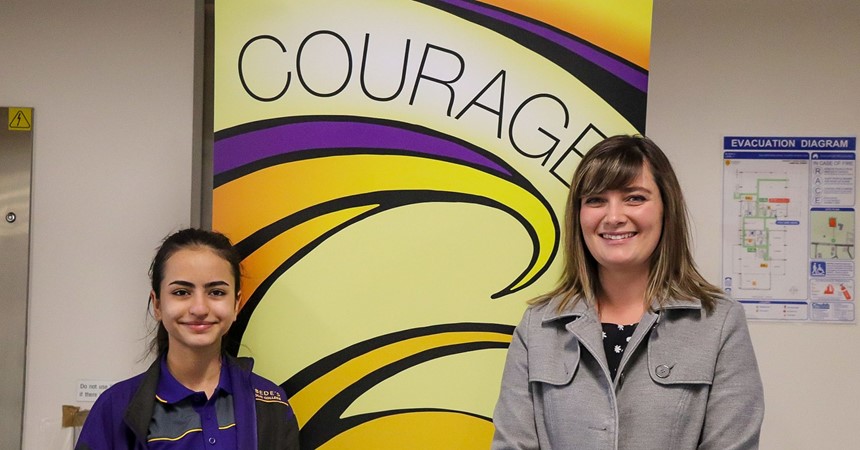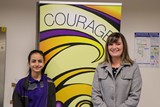The school’s social justice leaders Grace McMahon and Georgia Soper introduce the video before interviewing their fellow student Bahar Fayazi. St Bede’s English teacher Kiralee Bradley then shares the story of her great grandmother.
Grace and Georgia remind us of the takeaway from last year’s celebration – nobody chooses to be a refugee – before turning to Bahar, whose family fled religious persecution in the Middle East.
“There was a change of government in Iran and it said everyone had to be Muslim,” says Bahar. “Our family wanted to remain Christian, so we came to Australia. My family would have been killed or jailed for continuing to be Christians. I would have been in great danger.”
Bahar says the best thing about living in Australia is religious freedom. “You can be whatever religion you want, and everyone is fine with that,” she says.
Ms Bradley spoke about her great grandmother Olga’s refugee experience. Olga was 15 years old when World War II started, and she was forcibly removed from her home in the Ukraine and sent to a German labour camp where she made grenades and other artillery.
“She stole some food during that time, was punished severely, and then jailed,” says Ms Bradley. “Her injuries were so severe her collarbone rotted, and she also contracted tuberculosis.” Rather than being placed in a hospital “she was basically left for dead”.
Olga survived until the Americans liberated her labour camp in 1945.
“From there, she was put in a hospital where she met her first husband Emile, a soldier in the French army who became a well-decorated commander,” says Ms Bradley. “They were married and had their first child, who is my great aunt.
“Emile was put on assignment and sent to Vietnam. My great grandmother had the choice of going to France, going back home, or going to Australia or somewhere else in the British Commonwealth. She desperately wanted to come to Australia because her father had told her not to return home. And for some reason she didn’t want to go to France.”
It was at this stage Olga met Petras, the man who became her second husband and Ms Bradley’s great grandfather.
“They made the journey to Australia as a family unit,” she says. “Petras adopted my grand aunt so they could get on the boat, otherwise they wouldn’t have been able to come if they weren’t married and a whole family unit.”
After arriving in Australia, they were placed in the Greta migrant camp in the Hunter Valley. “Eventually, after a few years, I think 1952-53, they moved to Islington,” says Ms Bradley. “They lived around that area for a few years and then my nan met her third husband, Wally, who moved them into the Polish and Ukrainian community at Cardiff South, which is where me and my relatives grew up.”
Olga attended church regularly and was a huge part of the Ukrainian community. “She always talked fondly about the blue-eyed Americans who liberated her,” says Ms Bradley. “She said she was lying in jail and it was silent, and then she heard lots of noise and all of a sudden she was whisked away.
“She was very weak and couldn’t walk. She had a really tough experience under the Germans and then fleeing as a refugee after the war. She’s one of the most admired people in my family, one of the people I admire most, because of her strength and resilience and just grit to keep carrying on, just because you had to.”


